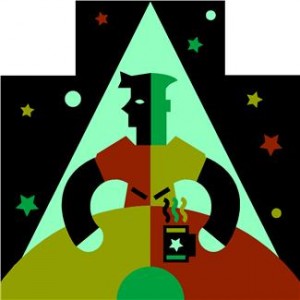School to work and back again: On (re)adjusting to academic life
01 June 2012 – Eleanor Mahoney
 This fall, I began my second stint in graduate school. After earning a M.A. in Public History in 2007 and working for the federal government and a nonprofit organization for four years, I am now back in a university setting, enrolled in an American History PhD program. How does it feel? Exhaustion, exhilaration, exasperation and excitement are a few more prominent emotions that come to mind. In other words, I am happy to be back, but still (re)adjusting to grad student life.
This fall, I began my second stint in graduate school. After earning a M.A. in Public History in 2007 and working for the federal government and a nonprofit organization for four years, I am now back in a university setting, enrolled in an American History PhD program. How does it feel? Exhaustion, exhilaration, exasperation and excitement are a few more prominent emotions that come to mind. In other words, I am happy to be back, but still (re)adjusting to grad student life.
I returned to academia because I felt the pull of research and writing. I knew there was more to learn and I wanted to share that through teaching. The wonderful moments of exhilaration and excitement, the weeks spent in an archive, poring over primary sources, the stimulating conversations in wonderful coffeehouses (yes, I do live in the Northwest!) and so much more that graduate school is known for…and yet, there is also the exhaustion.
Close to a decade removed from my B.A., I feel just a little old for this at times. All-nighters take me about a week to recover from and the lack of a set schedule is daunting not only for me, but also for my family and friends. I’m also feeling a bit frustrated (or maybe just surprised) by the differences between academic projects and my previous life in the public and nonprofit sectors. While I should know better, having been in graduate school before, I’m still taken aback by the solitary nature of this work. Perhaps it is more pronounced this time around, as the Public History program I attended emphasized group work, an experience that it not often available in traditional academic training, but perhaps should be as more and more History PhDs seek work and find fulfillment in non-academic settings. In other words, collaboration is not the norm and I often wish that it was– especially when working on articles or conference presentations.
I also miss the definitiveness of my professional life–and by this I mean that when a project was done, it was done. No re-editing endlessly, no chasing down new sources, finality–it can have its advantages. I also miss working with partners and being out in the field with various publics. At this early stage in my doctoral program, the main public is really just me, my committee and a few fellow students–an odd silence compared to the multiplicity of voices and perspectives I heard in the public history/conservation/preservation world I inhabited till a few months ago.
In any case, I’d love to hear what others who have returned to school after time working in the field are thinking and feeling. Was it the right decision? How did life as a professional help your academic work? Are you hoping to teach or pursue other career options in the future?
~ Eleanor Mahoney is a doctoral student in U.S. history at the University of Washington in Seattle, focusing on labor, the environment, memory, and place in late nineteenth and twentieth-century America. She received her M.A. in Public History from Loyola University Chicago.




Greetings! Though I am not making a re-entry into a graduate program, I am interested in what you are saying. I think your insights can be valuable to those considering their options and also those, like me, who are non-traditional (adult, returning, etc…) students. Any chance you might do a regular posting to keep us up-to-date on your particular journey? Personally, I am interested in ways of combining the worlds of academia and public history… what would that look like?
Hi! Another Seattle historian checking in (just received my MA in Archives and Public History from NYU, moved back to Seattle last month). I got my BA in History at University of Washington, and am very familiar with the department. Go Huskies!
Thanks for your reflective post– as the previous commenter pointed out, there’s a real place for academic historians who understand public audiences. To respond to her question on what that might look like, perhaps it could look like really engaged professors who are using multiple platforms/technologies to engage with a broader cross section of their students.
Eleanor, please continue to update us on your progress and your research!
Angela – thanks for your comment! I am hoping to post regularly on History@work and will keep this theme in mind. I actually just presented at a conference and it got me thinking even more about the ways academic life and public history life do and do not intersect. Maybe that will be my next topic…